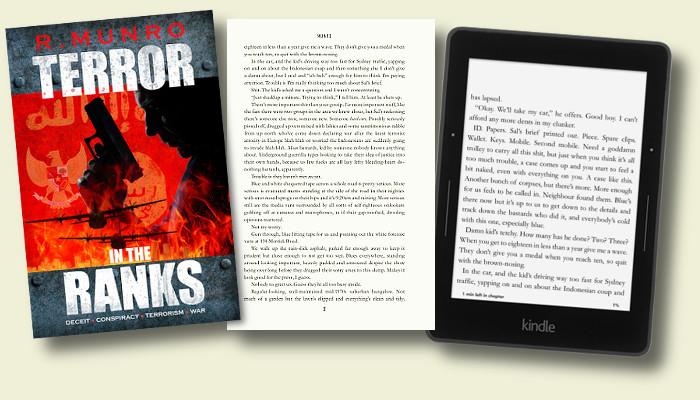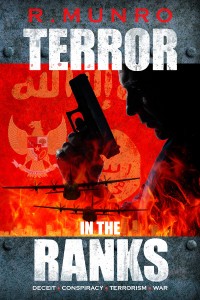It’s important to preface this essay with a caveat: I have various mental health issues, and cogent reasoning has been only marginally possible through a thick treacle of fatigue, anxiety, depression and myriad other maladies that have messed with my head for quite some time now. It’s very possible many of the issues and problems outlined below have been the result of normal things perceived through the frosted wobbly haze of my “challenges”, and the process of self-publishing is indeed a profitable breeze for most normal people. I’m afraid without a guide or proxy to assist, I’ve been on my own and had to work my own way through as best I can, which frankly isn’t saying much.
Anyway … to begin…
I wrote a book.
Then I wrote another and another, and before I knew it I had several novels done and dusted. Much of the time the words came easily, especially when I wasn’t battling foggy medication-induced mind-mangling. I learned the specifics of beta reading, editing and proof-reading, and before long I was performing said duties on not just client work but my own projects as well. I had colleagues who read what I wrote, and liked it a lot. Not neighbourly types or family members who humour you with platitudes—genuine dyed-in-the-wool critical eyes who’d point out all the pitfalls and shortcomings I’d missed, and before I knew it I had not just writing, but genuine literature on my hands.
It was therapeutic. It was good.
I felt as if I had accomplished something, which when you’re drifting on a tumultuous dark sea of confusion and illness, is a Really Good Thing™.
I sent one of my manuscripts off to an agent. I just knew they’d love it, love my writing, and one of their ranks would take my work under their wing and champion it to the right publisher, who would make it soar. I felt confidence for the first time in a long time.
Weeks turned into months, and finally there was the rejection slip. Oh well. Next crowd. Rejection slip. A year passed and the rejection slip pile simply grew. I remained confident. The trick was to find that special someone who was searching for a voice like mine. More rejection slips. Enough to dry my frustrated eyes. What were they seeing that I couldn’t? Or what was I seeing they couldn’t? I live off welfare and can’t do much in the way of “normal” work—writing seemed one way I could earn an income. Why were these people failing to see the commercial value of what I was sending them?
Something had to give, so I decided to delve into the challenge of self-publishing. There were plenty of companies advertising services for self-publishers. I researched. Sent emails. Even received phone calls. For the first time, I was grateful I had no money and couldn’t afford the services on offer—what a load of rubbish I came across. So many promises, such spin, execrable amounts of expensive nonsense. I was in this to make money, not spend it (especially seeing as I didn’t have any to spend anyway). So many snake-oil salesmen prowling the wings for unwary prey.
With the prospect of pay from a publisher via an agent rapidly diminishing, I chose to use my background in desktop publishing and go it alone. I created cover art, page layout and design to make my novel work as a printed book, before reformatting it to suit being an eBook. Job done, and uploaded to Smashwords for the eBook and Createspace for the hardcopy
Boom—one of my novels was out there in the big wide world.

There’s something special about getting your first ISBN, something quite magical about a barcode assigned just for your creation. I had hoped validation as an author would have come in the form of a contract with an agent, but instead it arrived in the mail as a hardcopy from Createspace. There it was—my creation made manifest. I thought it looked quite handsome, the pages a crisp white and filled with my words designed to shape thoughts, form characters, excite and entertain, so haughtily rejected by myriad would-be agents.
I’m not a salesman. Not for me the straw boater and cane, peddling to the masses. My mental health makes me appallingly shy (I genuinely have Social Anxiety Disorder, which largely condemns me to the house and away from dread “other people”), so rushing up to strangers and extolling the virtues of what I have to offer just isn’t one of my faculties. Nevertheless, in this day and age, the self-publishing author—like the painter or film-maker, or frankly any other creative profession—becomes the salesman. I don’t want to sell books, I want to write them. I’m an author, not a retailer! How does someone stuck at home sell books? I turned to Twitter and Facebook. I promoted. I found people who would spruik on my behalf. Thousands of people were reached. It was amazing. Thanks to Smashwords, my book was in every online retailer of eBooks, from Nook to Apple iBooks, Kobo to Scribd and beyond. Thanks to Createspace, my book was firmly ensconced in the Amazon universe, available in the US and UK and Australia, as well as Japan and Brazil and France, but not in Japanese or Portuguese or French, as I don’t have the kind of resources to afford a translation service. Coverage had been attained (in English anyway), success seemed assured.
Think again.
There are literally millions of new books out there, and it’s inevitable getting lost in the noise. Any author might have a Unique Selling Point (USP) for their novel, but it’s going to remain unheard unless a sales voice also has cut-through. In a sea of clamouring authors and publishers, that kind of cut-through is going to cost the kind of bucks that in many cases just makes it not worth it.
In the months since launch, I’ve spent $95 on paid promotions on both Twitter and Facebook. For that trouble, I’ve earned tens of thousands of “impressions” and $12 cash (after all up less than a dozen sales). I’m behind, and by the looks of things, getting into profit just isn’t going to happen despite continued promoting. Someone might suggest spending a bit more—say, $700—however not only do I not have $700 to piss against the advertising wall, and given everything I’ve researched, I remain unconvinced that kind of spend would return over $700 in revenue anyway. “You’ve got to spend money to make money”—yay, unless you don’t have any money to spend to begin with. Is that it? Is it not enough to slave over creating a book in the first place?
In the world of self-publishing: absolutely not. The book itself is only a minor cog in a much larger machine that still only maybe sees a return at the end.
Not that my book would win any prizes, but it’s not rubbish, either. Yet, I can’t convince folks to part with a measly dollar to read it. Is my writing truly worthless? Are people not interested in the thriller genre any more? I guess all they need for their fix is to turn on the TV news these days. Oh well.
So, I can only conclude it’s my fault (it always is, it seems), and I’ve screwed up somewhere. Maybe I can write good narrative prose of car chases, gunfights and terrorist attacks, only to suck at writing sales copy. It’s probably true—I never wanted to be a copywriter for magazines or newspapers flogging stuff, and attempting to write spin to sell my book seems to be a weakness or blindness on my part. Nobody’s sent me a demand notice ordering me to cease my wilful acts of promoting, so it can’t be that bad, but translating spin into sales just isn’t me.
Here’s the worst part: all this promoting, all this sales hustling, and I’m not writing. Not a word. I started on a sequel, but I’ve been spending all my time online, trying to find people who will buy my book, and my sequel (and other works) remains untouched. Self-publishing has transformed me from capable author into incompetent hustler. I’m not a salesman, I’m an author (I have a barcode and everything to prove it, too). I want to earn money from what I write, to lift me from below the poverty line, off welfare and into the guise of a self-reliant individual. My mental health needs it, and my ability to buy groceries needs it, too.
I need an agent who understands what I am as well as who I am, who believes in what I write and its ability—armed with cut-through in promotions designed by professionals who are sensational at promoting—to sell. Too many agents judge a writer’s ability on a few paragraphs or pages from a single manuscript. What if what I’ve written elsewhere is what’s needed to convince? It’s insane, it’s blinkered and it’s self-defeating. There are some extraordinarily wonderful authors out there who do very well. There are also some atrocious hacks who make good money, not because they’re lucky, but because they’re backed by agents and publishers who know how to sell, even if what they’re selling is really bad. I don’t know how to sell. I’m an author, not a salesman, and selling is not my job. I need a salesman—an agent who can work with a publisher to translate my writing into sales. Even if I’m a hack, surely it isn’t that hard? It’s done all the time. What’s another hack? Am I a hack? I didn’t think I was, and neither did my manuscript assessors, but maybe they’re wrong and I’m wrong and it turns out I’m the hackiest hack who ever hacked. That doesn’t mean what I write is unsellable. In some cases, quite the opposite.
Something else I have learned is to stick with it. Despite the disheartening lack of response, despite the shortcomings when it comes to alternatives to social media promoting (I don’t have mailing lists or any ability to cold-turkey contact bookstores to ask them to stock my book which I’d have to pay money I don’t have to get manufactured and shipped), I’m determined to not give up, either. Stay the course. I have to believe in the fullness of time word will continue to trickle out, and those individuals out there anxious to read something like what I’ve written will finally track my book down, buy it and enjoy it. Maybe some of them will leave reviews, and with those to hand, some of the best kind of cut-through might be achieved. Everyone who has reviewed it so far has been deeply appreciative and impressed, so there’s hope.
Don’t give up. Don’t lose hope. Just keep going.
My mental health is in such a state at the moment that I can’t write prose fiction even if I wanted to. It’s a kind-of writer’s block, and comes and goes to varying degrees. It’s my particular demon I have to bear. I’d love to get on with the sequel. I have it all mapped out, and reckon it’d be a corker of a read. Then again I thought the first was a corker to read as well, and all I get to see of it is languishing in a too-quiet corner of the world, pining for some love.
I guess the self-publishing route is good if you’re well resourced, well-connected and a natural at selling. For me it has been a route of frustration and expense I can’t afford, and the chances of me trying it again are extremely remote. The frustration has been nothing compared to the Quest for an Agent®, but I remain convinced that special someone is out there. Like readers, it’s about finding them, and helping them to find you.

You must be logged in to post a comment.